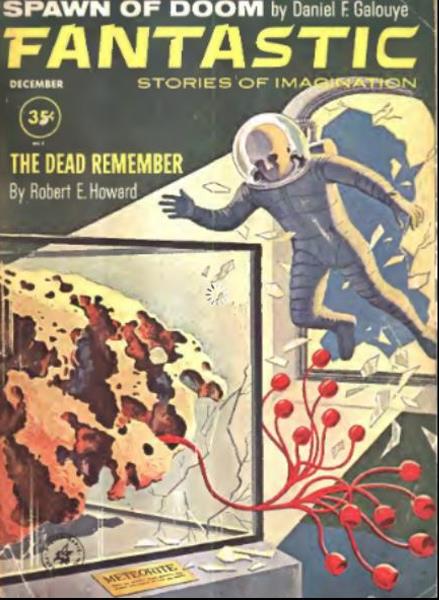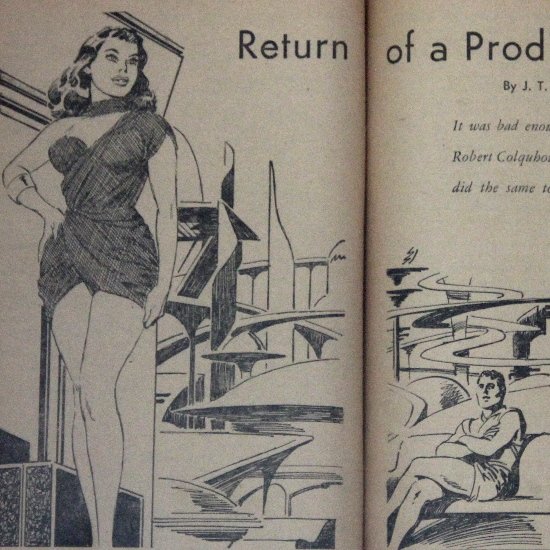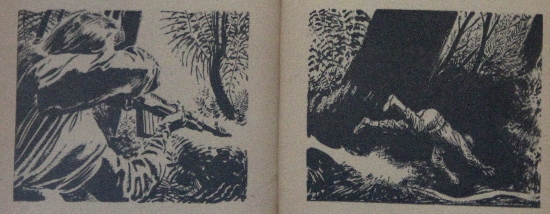
by Victoria Silverwolf
The last decade saw a boom in written science fiction as well as science fiction cinema, due in part to both the fear of atomic warfare and the promise of space exploration. Both trends have tapered off recently, possibly due to the many stories and films of poor quality offered to a public grown tired of cheap thrills. (No doubt such a fate awaits the countless Westerns currently dominating American television screens.)
In any case, the two media have had an influence on each other, not always to the advantage of either. Although science fiction movies have sometimes made use of the talents of important writers within the genre, such as Robert A. Heinlein’s contribution to Destination Moon, too often they have turned to the most juvenile pulp magazines and comic books for inspiration. In turn, some written science fiction has lost the sophistication it gained under editors such as John W. Campbell, H. L. Gold, and Anthony Boucher.

These musings come to mind when one peruses the pages of the latest issue of Fantastic. Of the two longest stories in the magazine, one is reminiscent of recent science fiction films, while the other deals directly with the movie business.
It seems likely that Daniel F. Galouye’s lead novelette Spawn of Doom (note the melodramatic title, which would not be out of place on a theater marquee) was inspired by Lloyd Birmingham’s cover painting. The scene depicted by the artist is described in great detail within the story, down to the exact number of tentacle-like things coming out of the meteorite on display in a museum.
This tale of a dangerous alien life form brought to Earth on a chunk of rock from outer space inevitably reminds the reader of movies like The Blob. However, the author brings imagination and intelligence to a familiar theme.
The story is told from three points of view. First we meet the humanoid Lumarians, aliens who patrol the galaxy in search of deadly creatures known as EGMites. These beings subsist on electro-gravito-magnetic energy, hence their name. When they land on a world after traveling through empty space in an unconscious state for immense periods of time, they prepare for reproduction by tearing the planet apart and sending spores out in all directions. Obviously this poses a threat to life everywhere in the cosmos.
Next we enter the newly awakened mind of an EGMite which has reached Earth. Filled with the desire to reproduce, and to destroy anything which seeks to interfere, it soon begins wreaking havoc on its surroundings, starting on a small scale but quickly escalating to the point where it is demolishing entire buildings.
Providing the viewpoint of endangered humanity is the curator of the museum where the EGMite’s meteoric hiding place is being exhibited. This rugged young hero is ably assisted by a capable and attractive archivist, who not only provides romantic interest, but is on hand to scream when the monster from space attacks. One can’t help wondering if the author has his tongue firmly in his cheek while describing these characters. However, the tale never degrades into farce, and the quick-moving plot builds the necessary amount of suspense. The transitions between the three points of view are sometimes abrupt, and the story has nothing particularly profound to say, but it’s solid entertainment. Three stars.
During the intermission between our two feature presentations, let’s take a look at something quite different. David Ely’s unusual story, The Last Friday in August, offers much food for thought. The protagonist dwells in a large city, and finds the crushing presence of the vast crowds nearly unbearable. He only finds peace through long periods of meditation. One day he finds that he has a strange power over others. This leads to an unexpected climax, which will leave the reader pondering its meaning. Well-written, subtle, and evocative, this tale is likely to haunt the reader for a long time. Four stars.
Back to the movies. Point, by John T. Phillifent (perhaps better known under his pen name John Rackham), deals with a group of filmmakers who travel to Venus to make their latest blockbuster. The proposed feature involves beautiful female Venusians, and seems intended to provide a bit of satire of silly science fiction movies such as Queen of Outer Space. Although the author’s description of Venus is a bit more realistic than that, it’s still not terribly plausible. The Planet of Love is a very dangerous place, inhabited by all kinds of deadly creatures, but its atmosphere is breathable, and humans can walk around on its hot, steamy surface without spacesuits. The plot deals with a pilot who agrees to take the film crew into the Venusian wilderness. As you might expect, things quickly go very wrong, and the story turns into a violent account of survival in a hostile environment. All in all it’s a fairly typical adventure yarn, competent but hardly noteworthy. Two stars.
After the double feature of novelettes we have a pair of short stories, one new and one old, to round out the magazine. Up first is The Voice Box, by Allan W. Eckert, a very brief tale about a man who hates and fears telephones. Written in a rather baroque style, it leads to a grim conclusion. Since I share the narrator’s loathing of that terribly intrusive instrument, I am forced to award three stars to what is admittedly a minor piece.
This issue’s "fantasy classic" is by Robert E. Howard, a prolific author of pulp fiction who committed suicide decades ago at the age of thirty. Best known to readers of speculative fiction for his tales of Conan and other fantasy adventures and horror stories, Howard also produced numerous stories in other genres ranging from sports fiction to Westerns. Published near the end of his life in the August 15, 1936 issue of Argosy, The Dead Remember is a tale of the supernatural set in Dodge City in 1877. The first part of the story takes the form of a letter from a cowboy to his brother, in which he confesses to the killing of a man and his wife during a drunk argument over a game of dice. Before she dies the woman places a curse on him. The second part of the story consists of several formal statements of witnesses to the fate of the murderer.
Although this is a typical story of revenge from beyond the grave, the unusual structure provides some novelty. Of most interest, perhaps, are the racial implications. The murdered man is a Negro, and his witch-like wife is a "high yellow" of mixed race. Although at first the killer seems to treat the married couple no differently than whites, when tempers flare the racial insults come out. The author seems to imply that a woman of mixed race would be closer to the supernatural than others. For its historical value, I’ll give this story two and one-half stars.
Overall this issue comes very close to a three star rating. It certainly provides a wide variety of reading material, and is almost certain to have something to please any reader of imaginative fiction.
See you at the movies!
And as luck would have it, the next article will feature a movie – the latest monstrous spectacular straight from Japan. Stay tuned! [the Traveler].













